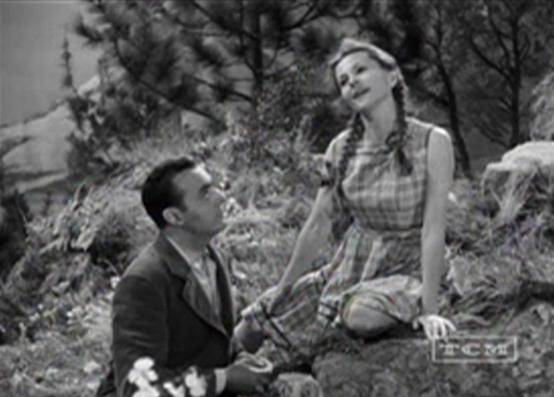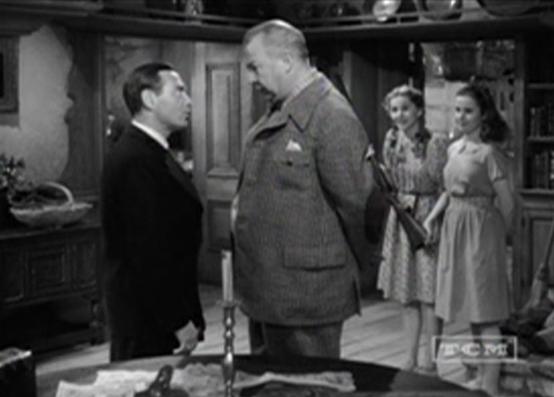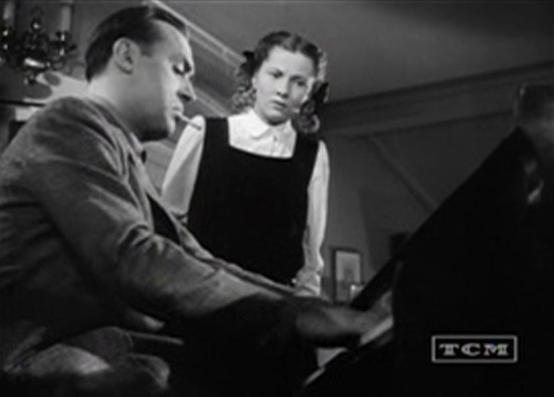Joan Fontaine was 24 years old at the time she played Tessa Sanger in Warner Brothers’ The Constant Nymph (1943). While Fontaine does manage to physically appear eight to ten years younger than she actually is in the role, the real trick is the absolutely convincing youthful exuberance that she sustains throughout the entire movie. She somehow perfectly captures the spirit of teenage innocence and awkwardness yet her character also manages to remain years ahead of herself when it comes to matters of music. This is especially true when it comes to the music of family friend Lewis Dodd, the composer portrayed by Charles Boyer, himself nearly 18 years Joan Fontaine’s senior and his character the older man that Fontaine’s Tessa loves.
Fontaine’s Tessa lives in picturesque Switzerland, one of four daughters that alcoholic but loving composer (Montagu Love) has fathered by three different wives. Kate is the oldest and while her part offers Jean Muir some of her best screen work, that work is limited to only a few scenes. Raven-haired Toni (Brenda Marshall) is next and seems least musically inclined as she carries out a romance with wealthy theater owner Fritz (Peter Lorre). Tessa and younger sister Paula are nearest in age and shared the same mother. Joyce Reynolds, the actress who plays Paula, was just 16 when The Constant Nymph was filmed, almost exactly eight years younger than Fontaine, yet the pair are convincing contemporaries with Fontaine, if anything, giving a more convincing portrayal of youth.
Fontaine scrambles about, skipping here and there and taking stairs full speed two at a time. She climbs over rocks and swings her limbs around immodestly, seeming all arms and legs at times. All of this activity is despite a heart condition that occasionally doubles the poor child up and more than hints at her mortality. Watching Tessa it is hard to remember that Joan Fontaine is at the time a beautiful movie star in her twenties. She runs around for a good portion of the movie in a short skirt, showing plenty of skin, yet there’s no hint of sex in her performance. Longing and desperate love, yes, but Tessa is sexless enough to cause Boyer’s Lewis to overlook her until after he’s married and its simply too late.
On his deathbed Albert Sanger suggests Lewis contact the well heeled family of Tessa and Paula’s mother to help take care of the girls. Uncle Charles (Charles Coburn) arrives with his daughter Florence (Alexis Smith), who soon marries Lewis.
Alexis Smith is quite young herself here, not even 21 and, I find this amazing, over 3-1/2 years younger than Fontaine! Yet this is the statuesque Smith at her most gorgeous, her face not yet as sharp as it will become or maybe it’s just her long flowing hair making her features seem not quite so broad and jagged. She towers over Fontaine and is every bit the opposite of her, a sophisticated woman who Boyer’s Lewis cannot resist. After their marriage we find Lewis and Florence back in her London home where Tessa soon arrives to unintentionally make life uncomfortable for the new Mrs. Dodd.
What’s wonderful about the tension between Tessa and Florence is that nobody is at fault. Florence is in love with Lewis, much more in love with him than he is with she. Tessa loves Lewis too, but he somehow cannot see this and her attraction remains innocent yet always burning. Innocent but obvious, and this wears on Florence bit by bit as the film progresses. Through music Tessa has a connection with Lewis that Florence can never hope to share. True feelings are finally revealed on the evening that Lewis’ new composition is set to debut. Before going to the theater each possible pairing of the three interact with one another and try to make sense of what has happened and what has always been.
There are so many wonderful facets to The Constant Nymph but I found myself most in love with Joan Fontaine’s brilliance in portraying innocence and modesty. Her Tessa grows up surrounded by art and culture, not highbrow dilettantism, but instead a magical world where creativity constantly emerges with stress placed on it being an honest and emotional creativity. She naturally possesses the emotional qualities that Lewis, a mechanical genius, cannot quite grasp on his own. While Tessa may long for more, even Lewis realizes that she is his muse.
Perhaps my favorite bit of dialogue in The Constant Nymph is so casually said by Tessa that it almost escapes notice. With older sister Toni pregnant, brother-in-law Fritz tells Tessa they’ll return to London in the Spring after the baby is born. Tessa replies, “Isn’t Toni excited? It’s such fun creating things, isn’t it?” In this comment she equates the act of creating life with that of creating art, and vice versa. Art is life to Tessa, an idea that perfectly captures her overall spirit and essence.
Director Edmund Goulding keeps a pace allowing three nations and 112 minutes to breeze by in a world whose characters completely connect with you thanks to the excellent performances he has captured from all players, most especially Fontaine, though Boyer is outstanding as well. The Constant Nymph is widely praised for its musical score as well as Lewis’ in-movie composition, Tomorrow, all by Oscar winning composer Erich Wolfgang Korngold. A visually exciting Switzerland is created for the Sangers by art director Carl Jules Weyl, who also worked on The Adventures of Robin Hood (1938), the film for which both he and Korngold won their only Oscars.
Charles Coburn provides laughs as irascible Uncle Charles and shares strong scenes with both Boyer and Alexis Smith. Eduardo Cianelli may have gone unnoticed as Roberto if it were not for Uncle Charles’ troubles in pronouncing his name, which always comes out with all the stress on the last syllable: Robert-O. Peter Lorre has several scenes, most importantly with Fontaine in the flower shop, and while his Fritz doesn’t figure as a very important character Lorre gives a strong account of himself. Dame May Whitty makes a brief but welcome appearance and an old friend of Coburn’s.
Joan Fontaine had intended to skip the 1942 Academy Award presentations because she had to be up early the next morning to continue work on The Constant Nymph. Phone calls from Motion Picture Relief Fund president Jean Hersholt and sister Olivia De Havilland, also a nominee that evening, convinced Fontaine to attend. Fontaine had been nominated the year before for her role in Hitchcock’s Rebecca (1940), but lost out to Ginger Rogers for her performance in Kitty Foyle. In ‘42 Fontaine took home the Academy Award for Best Actress for her work in another Hitchcock title, Suspicion (1941).
Fontaine wrote, “The morning after I received the award, I took my Oscar onto The Constant Nymph set, cradling it like a doll in my arms. The crew applauded as I entered. Now I was out of my black lace gown and back into pigtails and the fourteen-year-old’s wardrobe, consisting of tattered dress and tennis shoes” (136).
Her third and final Oscar nomination would come two years later for her part as the girl in the tattered dress and tennis shoes. The Constant Nymph was held back from release for over a year due to the war. The specifics were unspecified but The Constant Nymph likely found itself on hold because it did not include any mention of war itself, and so it was pushed back to make room for the propaganda films.
The film was released in June 1943 but extenuating circumstances caused it to disappear soon after. Classic movie fans who grew up with old titles playing in syndicated packages on television would have to wait a long time to see The Constant Nymph.
From the Winnipeg Free Press, June 11, 1966:
Question— There is a movie called The Constant Nymph which came out about 17 or 18 years ago. The leading actress I believe was Joan Fontaine, and the actor was Charles Boyer. It was a very moving love story — why has it not been shown on TV? I have been watching for it for years. — Mrs. E.M.J.
Answer — The Constant Nymph was released theatrically in July of 1943, which makes it 23 years old. Time flies, doesn’t it? It has not been on TV due to some legal entanglements concerning ownership of the original story.”
Rights reverted back to author Margaret Kennedy in 1951. Despite Kennedy’s death in 1967 The Constant Nymph would not be publicly viewed again until August 2010 at the Library of Congress’ Packard Campus Theater. The following year it played at TCM’s Classic Film Festival. In a 2011 Los Angeles Times interview George Feltenstein, Senior vice president of Warner Home Video’s theatrical catalog, explained, “We had to negotiate with the estate of Margaret Kennedy who wrote the book, but she also co-wrote the play and the movie was based on both the play and the book.” The Constant Nymph has since aired on Turner Classic Movies several times and in late 2011 was released to DVD as part of the Warner Archive Collection.
Margaret Kennedy’s novel was originally published in England in 1924. Two months later the music critic Augustine Birrell discovered the novel and helped make it a wildly popular success. It was published in America the following year and became a bestseller there as well. The Constant Nymph was also a critical success, though there was some backlash from the literati after it scored so well with the general reading public.
In 1926 Kennedy developed her novel into a play co-authored by Basil Dean and it became a great stage hit in London starring Noel Coward and Edna Best. Kathryn Scola’s script for the 1943 adaptation was based in part on this Kennedy-Dean play. This Warner Brothers production would be the third film version of The Constant Nymph, albeit the first from Hollywood. It had previously been made into a movie in Britain starring Ivor Novello and Mabel Poulton in 1928 and was remade by Gaumont British in 1933 with Brian Aherne and Victoria Hopper. Hopper played Tessa again in a 1938 television adaptation from the BBC.
An insight as to why Margaret Kennedy originally took the 1943 film out of circulation may be hinted at in her 1943 essay on film, The Mechanized Muse:
“In a great work of art the medium is so wedded to the subject that it becomes impossible to think of them apart. To take the writing out of a great novel is to run the risk of emptying out the baby with the bath … if any story has been perfectly told in one medium, what motive can there be for retelling it in another?” (Bluestone 90).
Kennedy lived long enough to see movies gain new life through television, a development which did not sway her. Of course, poor transmission and commercial interruptions wouldn’t have made the new format any more attractive. I wonder if she would have relented during our digital age. Thankfully her estate did and now we have access to this wonderful movie that had always been around, just not available to the general public, for approximately sixty years.
For more about this title please see reviews by Laura at Laura’s Miscellaneous Musings and Jacqueline at Another Old Movie Blog. Each goes into the background of this film’s status and each is equally as amazed as am I over Joan Fontaine’s performance.
Hope you enjoyed Joan Fontaine on TCM Tuesday. Be sure to check out what other film bloggers have to say at the Summer Under the Stars Blogathon at Sittin’ On a Backyard Fence and ScribeHard on Film.
Sources
- Bluestone, George. Novels into Film
. Berkeley and Los Angeles: University of California Press, 1968.
- Fontaine, Joan. No Bed of Roses: An Autobiography
New York: William Morrow, 1978.
- King, Susan. “TCM Classic Film Festival: ‘Night Flight,’ ‘The Constant Nymph,’ ‘Hoop-La.” Los Angeles Times 28 Apr 2011. Web. 5 Aug 2013.
- ”Queries.” Winnipeg Free Press 11 Jun 1966: 122. Web. NewspaperArchive. 5 Aug 2013.
[phpbaysidebar title=”The Constant Nymph Stars on eBay” keywords=”Joan Fontaine,Charles Boyer,Alexis Smith” category=”45100″ num=”5″ siteid=”1″ sort=”EndTimeSoonest” minprice=”59″ maxprice=”599″ id=”2″]












What a wonderful post, Cliff! You do a fantastic job capturing Fontaine’s performance — so hard to describe what she accomplishes, yet you do it wonderfully well — as well as the other actors. Love your description of Alexis Smith. It truly is remarkable she was younger than Fontaine!
Fontaine’s work is one of those things where you look back and think “How did she not get an Oscar for this?!”
Best wishes,
Laura
Laura, thank you so much for your comments. They mean a lot because, as I mentioned on Twitter, it was your post that first convinced me to give this one a try.
I completely agree: “How did she not get an Oscar.” Additionally, and this may be because it’s still so fresh to me (though I’ve now watched 4 times), Fontaine gives one of my favorite performances ever.
Thanks again, hoping that despite the late air time it gained some new fans last night!
Thank you for your good writing and industrious research. This is a “saver.”
Thank you so much, Mark, I’m really flattered that you enjoyed it and took time to stop by and say so!
Joan Fontaine’s performance here is one of the greatest I’ve ever seen, and I don’t think I’m exaggerating. She has the awkward body language down to a T. I was blown away the first time I saw her work in this film, which is also pretty terrific.
Kevin, I don’t think you’re exaggerating either! As I mentioned to Laura above it’s become an all-time favorite for me and really, if anything, it only got better when I returned to it this week. Agree, the entire film is wonderful with perhaps my only reservation being Alexis Smith’s quick turnaround towards the end. That felt like loose ends were being tied up ASAP. Otherwise, perfect!
I enjoyed your post very much, Cliff, and thank you for the mention.
Thanks! I enjoyed yours as well and especially got a kick out of your fascination with the actual ages of the performers too … had to double-check some of my math when I got back from your site!
I have yet to see this, but after your recommendation, plus Laura’s piece, AND Carley of Kitty Packard being blown away after the screening at the TCM Festival, I really need to put it on the shortlist.
Thanks for a fantastic review, Cliff.
Highly recommended, Jill. You know I usually like grittier stuff than this and it has other elements that typically don’t thrill me but The Constant Nymph is just so well done with such great performances, especially Fontaine, that I absolutely fell in love with it.
This is a very beautiful adaptation of Kennedy’s novel, but I admit that I’ve especially longed to see the 1928 silent version ever since seeing a stunning clip in Kevin Brownlow’s Cinema Europe documentary. It retains the original ending where Tessa goes off with Lewis at the end. Probably will never happen, though, which makes me sad. I’m not sure if it’s in the same copyright limbo that the ’43 version was stuck in for so long, but it’s seemingly impossible to view outside of British archives.
Hi @irenebullock1021,
Well, at least it exists and hopefully the maneuvering that it took to clear the path for this 1943 version to come back to us can serve as some sort of precedent for the silent version in time. I must confess that I haven’t read the novel, but I so enjoyed Joan Fontaine’s performance here that I have a hard time believing I’d prefer another version–but I’d love the opportunity to find out!
Thank you for taking the time to comment!
Cliff